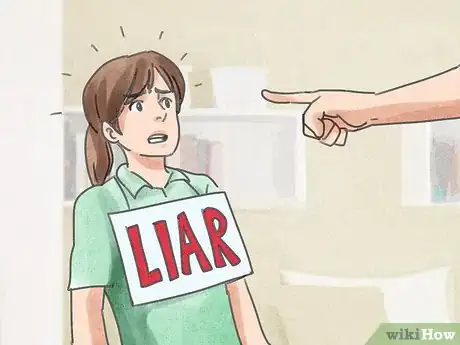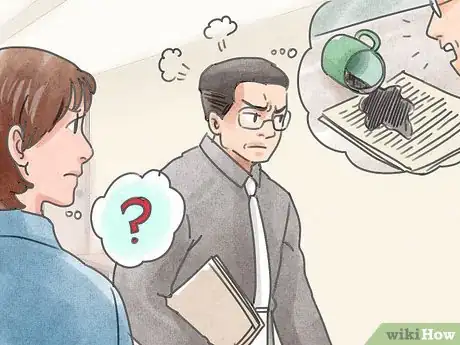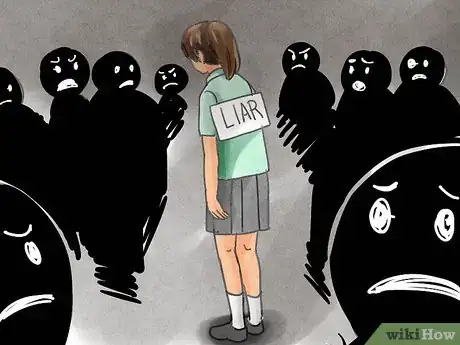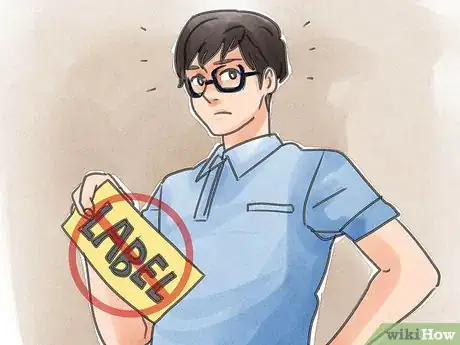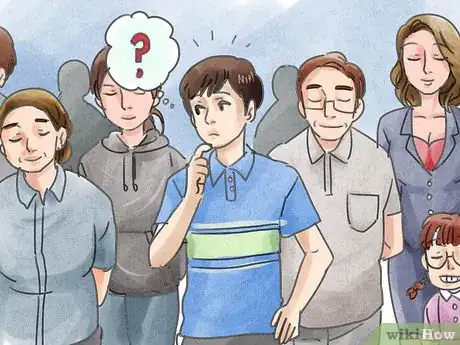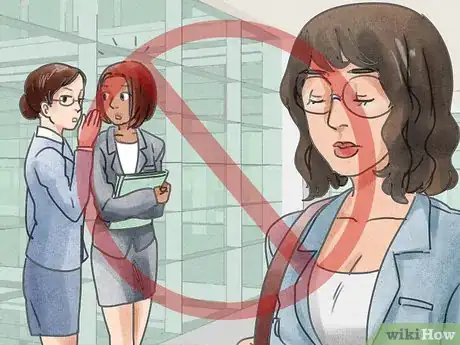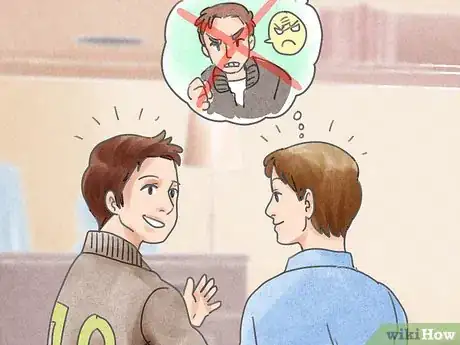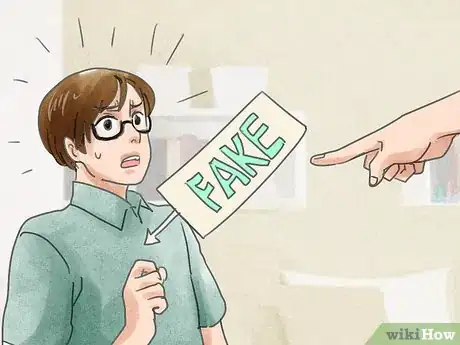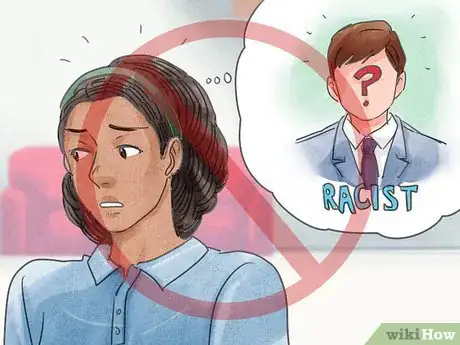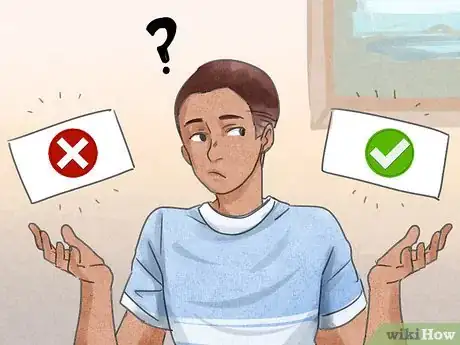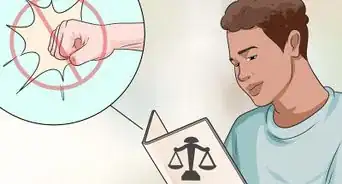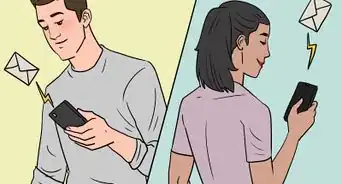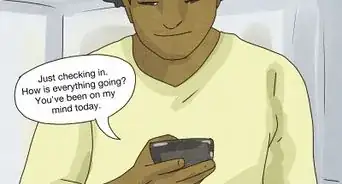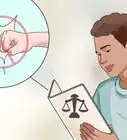This article was co-authored by Karuna Jain, MS. Karuna Jain is a Life Coach, Energy Healer, and the Owner of the Karuna Healing Center based in the San Francisco Bay Area. With more than 13 years of experience, she specializes in helping others heal through life coaching, hypnotherapy, reiki healing, pranic healing, and crystal healing. Karuna attended the Hypnosis Motivation Institute to receive her Hypnotherapy Certification. She also has a Life Coach Certification through the American Union of NLP.
There are 9 references cited in this article, which can be found at the bottom of the page.
This article has been viewed 52,221 times.
Labels, stereotypes and categorizing can all be helpful mental functions that allow us to quickly make sense of our busy and confusing world;[1] however, labeling can sometimes cause us to make false, unjustified and harmful judgements if those labels aren't carefully considered. Thankfully, rushing to conclusions and applying labels that aren't based in reality is something that can be avoided.[2]
Steps
Ending the Habit of Labeling Others
-
1Think about how being labeled would affect you. Taking a few moments to imagine how being labeled by others would affect your life is a great way to understand the impact your own labels could have on someone else.[3] Whenever you notice yourself inappropriately labeling someone, try to think about how you would feel if they did the same to you. Knowing how harmful being labeled can be, you may find it easier to avoid labeling others in the future. [4]
- Imagine if someone labeled you as being “angry” and treated you differently because of it.
- Consider how you would feel if someone labeled you as a “liar,” even though you aren't one.
-
2Consider why someone might act the way they do. You won't always know why someone is acting in a certain manner.[5] It can be misleading and possibly harmful to apply a label to someone if you don't fully understand the reasons for his behavior. Always try to avoid labeling someone, especially if you aren't sure why they behave the way they do.[6] [7] [8]
- For example, you might meet someone for the first time and he acts very short and coldly towards you. You may be tempted to label him as distant or grumpy; however, he may have just had his car towed before you met him, and is usually very pleasant.
- Maybe your neighbor ignores you sometimes when you say hello in the morning and you think he is rude. You might later find out he has a hearing problem and simply didn't hear you.
Advertisement -
3Ask for your friends to help you. It can be difficult to notice when you are labeling people if you are just beginning to put an end to the habit. Asking your friends to help you notice when you are labeling others can be a big help. Your friends can help you notice when you are applying labels to others. Try working together with your friends to help each other stop labeling people.[9]
-
4Imagine how labeling might affect someone's life. Although labels are just words, they can have serious effects on a person's behavior and can change how people are treated. Before you label someone, try to imagine what effect that label might have on her life or think about how she would feel if she heard you had labeled her.[10]
- For example, if you label someone as being “untrustworthy”, others might also view her in the same way. This person may then be treated unfairly because of the inaccurate and harmful label.
- Maybe you've incorrectly labeled a neighbor as being “scary” and try to avoid her. This can needlessly cause her to feel unwelcome or make her worry that something is wrong with her.
-
5Remember that a person is more than a label.[11] When you encounter someone who has been labeled or you have labeled them yourself, remember that they are more than just that label. Human behavior is complex and a simple label won't capture the entire personality of an individual. Everyone has different emotions and interests. People you meet are people first, not labels.[12]
- For example, someone who has schizophrenia may have the label “mentally ill”. While he has an illness, he is also more than that illness and deserves the same respect you'd give to anyone else.
- Someone who needs a wheelchair may be labeled as being “disabled." Try to think of him as a “person with a disability,” not a “disabled person.” This should not stop you from being friends with them.
-
6Focus on what you have in common with others. It can be easy to look at others and see what separates them from yourself; however, focusing on what you have in common with others can go a long way in cutting down on the amount of labels you apply to them. Always remind yourself of the similarities you share with others, not your differences.[13] At the end of the day, we're all people, with similar wants and needs. Remember the person has a family, goals and aspirations, and challenges, just like you.[14]
-
7Avoid gossiping. If you find yourself gossiping about other people, try to stop and shift the focus of your conversation. Gossip can easily create more labels for the people you are discussing. Avoid gossiping to help reduce the amount of labels you create and place on others.[15]
- Gossip will generally lead to harmful and inaccurate labels.
- Always try to represent a person as accurately as you can during a conversation about them.
-
8Challenge your preconceived notions. Maybe you've already labeled a person or group of people negatively. A good way to challenge those labels is to get out and experience them first hand. You'll likely find that your labels weren't accurate and that there are plenty of great qualities that you've missed because of them. Try going out and challenging your preconceived labels to discover the real character of a person or group of people.
- Some typical preconceived notions you might have without even realizing it include gender labels (e.g. "She's emotional because she's a woman," or "She's a bad driver because she's a woman."); age labels (e.g. "He's an old man so he's probably racist," or "He's just senile."); labels based on race or nationality (e.g. "She's Asian so she's probably a terrible driver."); and so on.
Improving Your Life by not Labeling Others
-
1Gain a more accurate view of yourself.[16] Whenever you label another person negatively, it allows you to give up on that person and takes responsibility off of you. If you feel it's always someone else who is the troublemaker or problem, it will leave you feeling resentful and powerless. In addition, you will miss the areas in which you could improve your situation or yourself. Keep an accurate view of your own actions and attitudes to help you better understand others and stop labeling them.[17]
- Avoid blaming or labeling others when something goes wrong in your life.
- Realize when you've made a mistake and accept responsibility for it, instead of labeling someone else as the problem.
- Often, a person who always thinks his problems are because of someone else — everyone else is too sensitive, they're all jerks, etc. — is failing to take responsibility for his own challenges and recognize areas where he may need to grow and improve.
-
2Obtain a better understanding of others.[18] Even though it may seem convenient to apply labels to others, they aren't of much actual use. Since you won't often know the full story behind someone's life, any labels you apply will be inaccurate representations of the person's personality. Avoid applying labels to others to help you gain a more realistic understanding of them.[19]
- Getting to know a person will allow you to more accurately understand them.
- Applying a label without understanding a person will only result in a false image of them.
- Learning more about a person will make it more difficult to invent harmful labels or stories about them.
-
3Build stronger relationships by removing negative or baseless labels. When you stop applying labels to someone and take time to get to know them, you'll be able to build a stronger and more rewarding relationship. Misleading or false labels can cause you to avoid getting to know someone and may end up with you missing out on some great friendships. Steer clear of applying negative labels to increase your chances of building better, stronger and longer lasting relationships.[20]
- For example, maybe you've always thought your coworker was “weird;" however, once you got to know them a bit better, you might actually find out that you've both got a lot in common and enjoy one another's company.
- Or maybe you assume that someone is "disabled" because they're in a wheelchair. But, when you start asking them about their hobbies, you actually find out they're a serious athlete who plays wheelchair basketball and rugby. Asking the person questions and getting to know them can challenge the label you placed on them based on your assumptions.
- Moving past labels and learning more about who the person actually is can be a great way to find the good in whoever you're meeting.
-
4Become a more understanding person. Labeling people can be a quick way to write a person off, whether she has actually wronged you or not; however, by being more compassionate and understanding, you can avoid labeling a person and allow your relationship with her to grow. Try to be understanding with others to avoid applying harmful or needless labels to them.[21]
- Let the past go and actively forgive someone.
- Focus on the facts of a situation to gain a better view of what actually happened.
- Try to give people a second chance.
- Understand when something was a one-time mistake.
Understanding the Negative Effects of Labeling Others
-
1Realize your labels have a real effect. Whenever you apply a label to someone, you will act as if that person is actually the way you imagine him to be. Your response to him can cause him to react in a way that is consistent with your view. At the very least, any action he takes will only serve to fit your label and reinforce any wrong ideas that you might hold. Knowing that your labels can affect people's behavior and your own actions can help you stop applying them.[22] [23]
- For example, thinking of someone as "argumentative" may cause you to be defensive, even if there is no argument.
- Thinking that someone is often upset and regularly asking him if he is may actually cause him to be upset.
-
2Avoid getting the wrong idea about someone. People often apply labels to others because they don't have information about the person. Labeling someone without knowing much about her can easily lead to false conclusions. To avoid unnecessary stress or conflict, try to avoid applying needless or negative labels.[24] [25]
- Someone may have told you that your boss is a “bully.” It's best to get to know your boss before accepting this label to avoid building up a false image of her.
- You might worry every time you walk by your “dangerous” neighbor; however, you might learn that she is actually one of the kindest people you've met and that all the worrying was for nothing.
-
3Understand that labels actually change your perception. Labels can be more than just harmless words and may actually change how you see a person. Studies have shown that the labels people apply to other people can change how they are seen. People may also change their actions and attitudes towards people based solely on the labels that have been applied. Because labels are so persuasive in a person's mind, it's a good idea to avoid the negative, misleading or misinformed labeling of others.[26]
- For example, if you label someone as being “angry” you may think that he slams doors or stomps around, even though he is no more aggressive than anyone else.
- If you label someone as being “ugly,” there is a good chance that all you will see are the “ugly” things about him.
-
4Know when it's okay to label someone. After you've gotten to know a person, it can be appropriate to apply a few labels to her. As long as you aren't using labels as a replacement for actually learning more about a person, applying a few of them can be helpful. If you think that you really do understand who a person is, it's normal and useful to apply a few labels to that person.[27]
- Evaluate your labels and make sure they match up with reality.
- Labels like "compassionate," "dishonest," "wild," or "kind" can all be helpful; however, you should only use labels like these after you've gotten to know a person, and you should probably keep them to yourself. Let other people form their own opinions.
- Sometimes, negative labels might actually apply to someone and they can be helpful tools when dealing with that person.
- Labels should never be used to justify treating someone poorly.
Expert Q&A
-
QuestionHow do I stop being so judgmental?
 Karuna Jain, MSKaruna Jain is a Life Coach, Energy Healer, and the Owner of the Karuna Healing Center based in the San Francisco Bay Area. With more than 13 years of experience, she specializes in helping others heal through life coaching, hypnotherapy, reiki healing, pranic healing, and crystal healing. Karuna attended the Hypnosis Motivation Institute to receive her Hypnotherapy Certification. She also has a Life Coach Certification through the American Union of NLP.
Karuna Jain, MSKaruna Jain is a Life Coach, Energy Healer, and the Owner of the Karuna Healing Center based in the San Francisco Bay Area. With more than 13 years of experience, she specializes in helping others heal through life coaching, hypnotherapy, reiki healing, pranic healing, and crystal healing. Karuna attended the Hypnosis Motivation Institute to receive her Hypnotherapy Certification. She also has a Life Coach Certification through the American Union of NLP.
Life Coach & Energy Healer Focus on changing your perceptions! If you can become aware that you're judging someone, you can stop yourself from that negative line of thinking and transition to a more positive train of thought. As you shift your perceptions, you'll realize that everybody is doing their very best, even if their definition of "very best" doesn't align with yours.
Focus on changing your perceptions! If you can become aware that you're judging someone, you can stop yourself from that negative line of thinking and transition to a more positive train of thought. As you shift your perceptions, you'll realize that everybody is doing their very best, even if their definition of "very best" doesn't align with yours.
References
- ↑ https://www.psychologytoday.com/blog/alternative-truths/201005/why-its-dangerous-label-people
- ↑ Karuna Jain, MS. Life Coach & Energy Healer. Expert Interview. 23 November 2021.
- ↑ Karuna Jain, MS. Life Coach & Energy Healer. Expert Interview. 23 November 2021.
- ↑ http://www.fatherhood.org/bid/185434/6-Tips-to-Avoid-Labeling-Your-Child
- ↑ Karuna Jain, MS. Life Coach & Energy Healer. Expert Interview. 23 November 2021.
- ↑ http://www.fatherhood.org/bid/185434/6-Tips-to-Avoid-Labeling-Your-Child
- ↑ http://www.hrvoice.org/avoiding-stereotypes-in-the-workplace/
- ↑ Karuna Jain, MS. Life Coach & Energy Healer. Expert Interview. 23 November 2021.
- ↑ http://www.fatherhood.org/bid/185434/6-Tips-to-Avoid-Labeling-Your-Child
- ↑ http://www.fatherhood.org/bid/185434/6-Tips-to-Avoid-Labeling-Your-Child
- ↑ Karuna Jain, MS. Life Coach & Energy Healer. Expert Interview. 23 November 2021.
- ↑ https://www.iidc.indiana.edu/pages/Whats-in-a-Name-Our-Only-Label-Should-Be-Our-Name-Avoiding-the-Stereotypes
- ↑ Karuna Jain, MS. Life Coach & Energy Healer. Expert Interview. 23 November 2021.
- ↑ http://www.hrvoice.org/avoiding-stereotypes-in-the-workplace/
- ↑ http://bigthink.com/artful-choice/the-power-of-negative-gossip-coloring-how-we-see-the-world-one-rumor-at-a-time
- ↑ Karuna Jain, MS. Life Coach & Energy Healer. Expert Interview. 23 November 2021.
- ↑ http://www.bizjournals.com/bizjournals/how-to/growth-strategies/2015/10/how-to-stop-labeling-people-and-how-that-will.html
- ↑ Karuna Jain, MS. Life Coach & Energy Healer. Expert Interview. 23 November 2021.
- ↑ http://www.bizjournals.com/bizjournals/how-to/growth-strategies/2015/10/how-to-stop-labeling-people-and-how-that-will.html
- ↑ http://www.hrvoice.org/avoiding-stereotypes-in-the-workplace/
- ↑ http://www.mayoclinic.org/healthy-lifestyle/adult-health/in-depth/forgiveness/art-20047692
- ↑ http://www.mediate.com/articles/RowlesJbl20160318.cfm
- ↑ https://www.psychologytoday.com/blog/alternative-truths/201005/why-its-dangerous-label-people
- ↑ http://www.mediate.com/articles/RowlesJbl20160318.cfm
- ↑ http://www.bizjournals.com/bizjournals/how-to/growth-strategies/2015/10/how-to-stop-labeling-people-and-how-that-will.html
- ↑ https://www.psychologytoday.com/blog/alternative-truths/201005/why-its-dangerous-label-people
- ↑ https://www.psychologytoday.com/blog/alternative-truths/201005/why-its-dangerous-label-people

